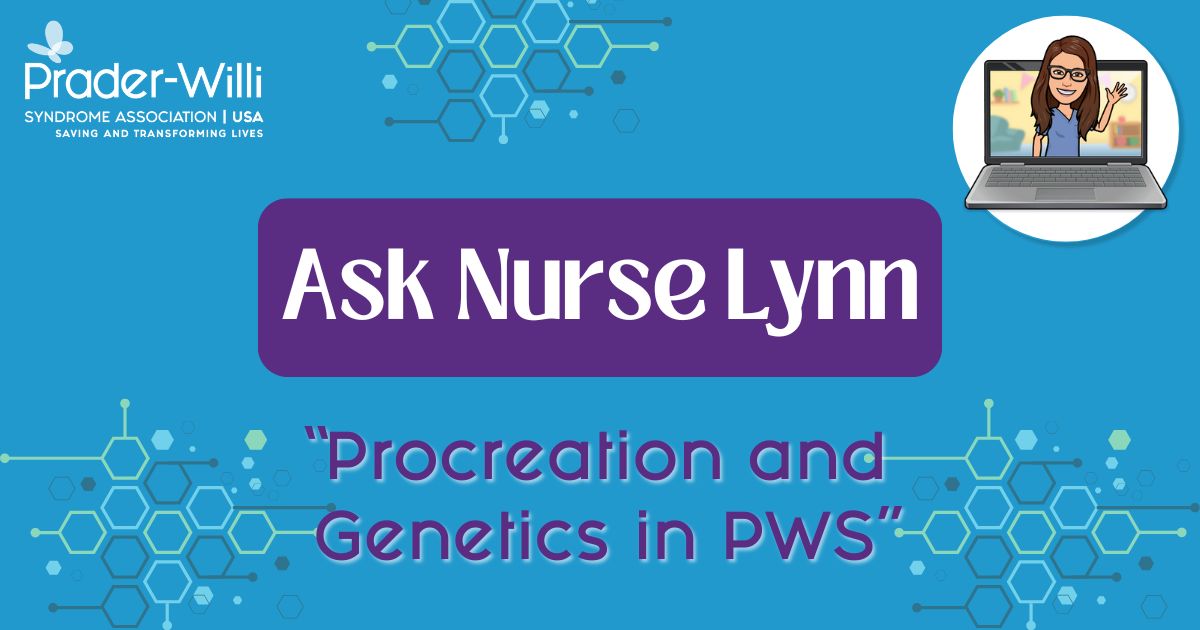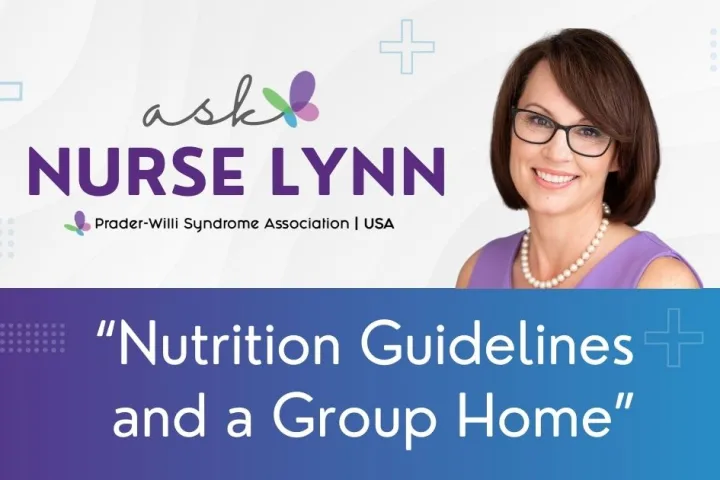Question:
Female, 34, Deletion
My daughter continues to wonder how/why some ladies with PWS have been able to conceive, give birth. As a teenager, an ultrasound determined that she had “follicles”, but she’s not ever menstruated. She continues to want to investigate the possibility of becoming pregnant. We’ve explained that this is highly unlikely, but she’s learned of a handful of women with PWS who have … Your thoughts, please.
Nurse Lynn’s Response:
I have consulted with one of our experts to help in answering your question. The presence of ovarian follicles does not equate with the ability to ovulate, or the ability to carry a pregnancy to term. Depending on the exact molecular/genetic cause of PWS, a viable fetus may not be possible. Articles and narratives of the four known pregnancies in women with PWS suggest that the gestations and deliveries were uncomplicated. Three babies were delivered by planned caesarean sections. None of the mother’s breast fed nor were they able to bond with the children. The infants were cared for by others, most often relatives. Common for all was an incapacity to put the needs of the child ahead of their personal needs and desires, especially about food.
The genetics of the children born to mothers with PWS has varied. Theoretically, the chance of a fertile woman with PWS having a non-PWS baby depends on what genetic type of PWS the mother has. A woman with PWS due to uniparental disomy (UPD) is not at risk of passing on a genetically altered chromosome 15 for PWS. A woman with PWS due to a deletion has a 50% chance with each pregnancy of passing on the chromosome with the deletion and having a baby with Angelman syndrome (AS). AS results from deletion or mutation of the maternal chromosome 15 (q11-q13 region), so if the mother passes along her own maternally derived chromosome 15, the baby will be unaffected; but if she passes on her paternally derived chromosome 15 with the deletion instead, then the baby will have AS. Characteristic symptoms of AS are severe developmental delay and/or intellectual disability, little or no speech, movement and balance disorders, and a unique behavior with an inappropriate happy demeanor that includes frequent laughing, smiling, and excitability. Many have profound sleeping problems and epilepsy. In the four documented cases of pregnancies in women with PWS, two of the children had normal chromosome 15 (mothers had deletion and UPD, respectively), the other two had AS (mothers had both deletion).
Do you have a question for Nurse Lynn? Submit your question here:
Share this!





 Perry A. Zirkel has written more than 1,500 publications on various aspects of school law, with an emphasis on legal issues in special education. He writes a regular column for NAESP’s Principal magazine and NASP’s Communiqué newsletter, and he did so previously for Phi Delta Kappan and Teaching Exceptional Children.
Perry A. Zirkel has written more than 1,500 publications on various aspects of school law, with an emphasis on legal issues in special education. He writes a regular column for NAESP’s Principal magazine and NASP’s Communiqué newsletter, and he did so previously for Phi Delta Kappan and Teaching Exceptional Children. Jennifer Bolander has been serving as a Special Education Specialist for PWSA (USA) since October of 2015. She is a graduate of John Carroll University and lives in Ohio with her husband Brad and daughters Kate (17), and Sophia (13) who was born with PWS.
Jennifer Bolander has been serving as a Special Education Specialist for PWSA (USA) since October of 2015. She is a graduate of John Carroll University and lives in Ohio with her husband Brad and daughters Kate (17), and Sophia (13) who was born with PWS. Dr. Amy McTighe is the PWS Program Manager and Inpatient Teacher at the Center for Prader-Willi Syndrome at the Children’s Institute of Pittsburgh. She graduated from Duquesne University receiving her Bachelor’s and Master’s degree in Education with a focus on elementary education, special education, and language arts.
Dr. Amy McTighe is the PWS Program Manager and Inpatient Teacher at the Center for Prader-Willi Syndrome at the Children’s Institute of Pittsburgh. She graduated from Duquesne University receiving her Bachelor’s and Master’s degree in Education with a focus on elementary education, special education, and language arts. Evan has worked with the Prader-Willi Syndrome Association (USA) since 2007 primarily as a Crisis Intervention and Family Support Counselor. Evans works with parents and schools to foster strong collaborative relationships and appropriate educational environments for students with PWS.
Evan has worked with the Prader-Willi Syndrome Association (USA) since 2007 primarily as a Crisis Intervention and Family Support Counselor. Evans works with parents and schools to foster strong collaborative relationships and appropriate educational environments for students with PWS. Staci Zimmerman works for Prader-Willi Syndrome Association of Colorado as an Individualized Education Program (IEP) consultant. Staci collaborates with the PWS multi-disciplinary clinic at the Children’s Hospital in Denver supporting families and school districts around the United States with their child’s Individual Educational Plan.
Staci Zimmerman works for Prader-Willi Syndrome Association of Colorado as an Individualized Education Program (IEP) consultant. Staci collaborates with the PWS multi-disciplinary clinic at the Children’s Hospital in Denver supporting families and school districts around the United States with their child’s Individual Educational Plan. Founded in 2001, SDLC is a non-profit legal services organization dedicated to protecting and advancing the legal rights of people with disabilities throughout the South. It partners with the Southern Poverty Law Center, Protection and Advocacy (P&A) programs, Legal Services Corporations (LSC) and disability organizations on major, systemic disability rights issues involving the Individuals with Disabilities Education Act (IDEA), Americans with Disabilities Act (ADA), and the federal Medicaid Act. Recently in November 2014, Jim retired.
Founded in 2001, SDLC is a non-profit legal services organization dedicated to protecting and advancing the legal rights of people with disabilities throughout the South. It partners with the Southern Poverty Law Center, Protection and Advocacy (P&A) programs, Legal Services Corporations (LSC) and disability organizations on major, systemic disability rights issues involving the Individuals with Disabilities Education Act (IDEA), Americans with Disabilities Act (ADA), and the federal Medicaid Act. Recently in November 2014, Jim retired.